Our list of the most queer friendly Arab countries based on our first-hand experience traveling in each, contrasted against their respective LGBTQ laws.
Being openly gay in the Arab world is certainly not an easy feat. If it doesn’t land you a jail sentence(!) or capital punishment(!!), the huge stigma attached to it will likely compromise your job prospects, alienate your family, or worse, make you the target of some pretty nasty homophobic violent crimes.
The point of this article is to show that despite being a very difficult place in the world for the LGBTQ community, there is a glimmer of hope for a better future. We are by no means saying these are gay havens in any way!

To be clear, being gay is illegal and difficult here full stop! What we are, however saying is that despite the negative press we hear about gay rights in the Arab world, there does exist a local LGBTQ community in each of these countries fighting for recognition, acceptance, and the basic freedoms we take for granted. We aim to help celebrate and support them in any way we can!
Despite almost non-existent gay rights in the Arab world, there does exist a local LGBTQ community fighting for recognition and acceptance
We have traveled extensively around the Middle East as a gay couple and overall had a positive experience. For example, we climbed the world’s tallest building in Dubai, wandered around the souks of Tunis, visited the impressive mosques in Abu Dhabi, and got lost in the messy cutesy streets of the Algier's Casbah in Algeria.
Of course, we were always cautious to avoid any public displays of affection and only booked a double bed in hotels we were certain were gay friendly. In short, for our safety, we had to go back into the closet.
In this article, we've set out the 5 most gay friendly Arab countries based on our first-hand experience and research. This only relates to the 22 Arab countries around the Middle East and North Africa, which are also member states of the Arab League, therefore, this does not take into account Israel, Turkey, and Iran. Be sure to also check out our guide to what we think are the most dangerous countries for gay travelers.
The selection process and 2025 update:
Our list of the most gay friendly Arab countries in the world is based on our first-hand experience as well as cross-referencing their LGBTQ laws, such as whether homosexuality is legal, or if proactive steps are being taken to legalize it. In addition, we were impressed by countries in the Arab world that have allowed LGBTQ events to take place publicly.
We prioritized the Arab countries that got rid of their anti gay laws – specifically Jordan and Bahrain. Then looked at how active the local LGBTQ+ community is, the (underground) gay scene and any queer events. One thing's for sure, having Saudi Arabia on this list is something we never envisaged when we first published this article back in 2019! Back then, it was a country you wouldn't even dare think of going to as a gay person. Also, back then, we had Lebanon top of this list…sadly, times have changed, and we can no longer include it.
Another point to note, we deliberately did not include the United Arab Emirates (UAE). Whilst Dubai, and to a lesser extent Abu Dhabi, have a lot of underground gay parties happening throughout the year, this is largely down to the large expat/cabin crew community in the country rather than it being a local initiative like it is in, say Saudi Arabia.
5. Tunisia
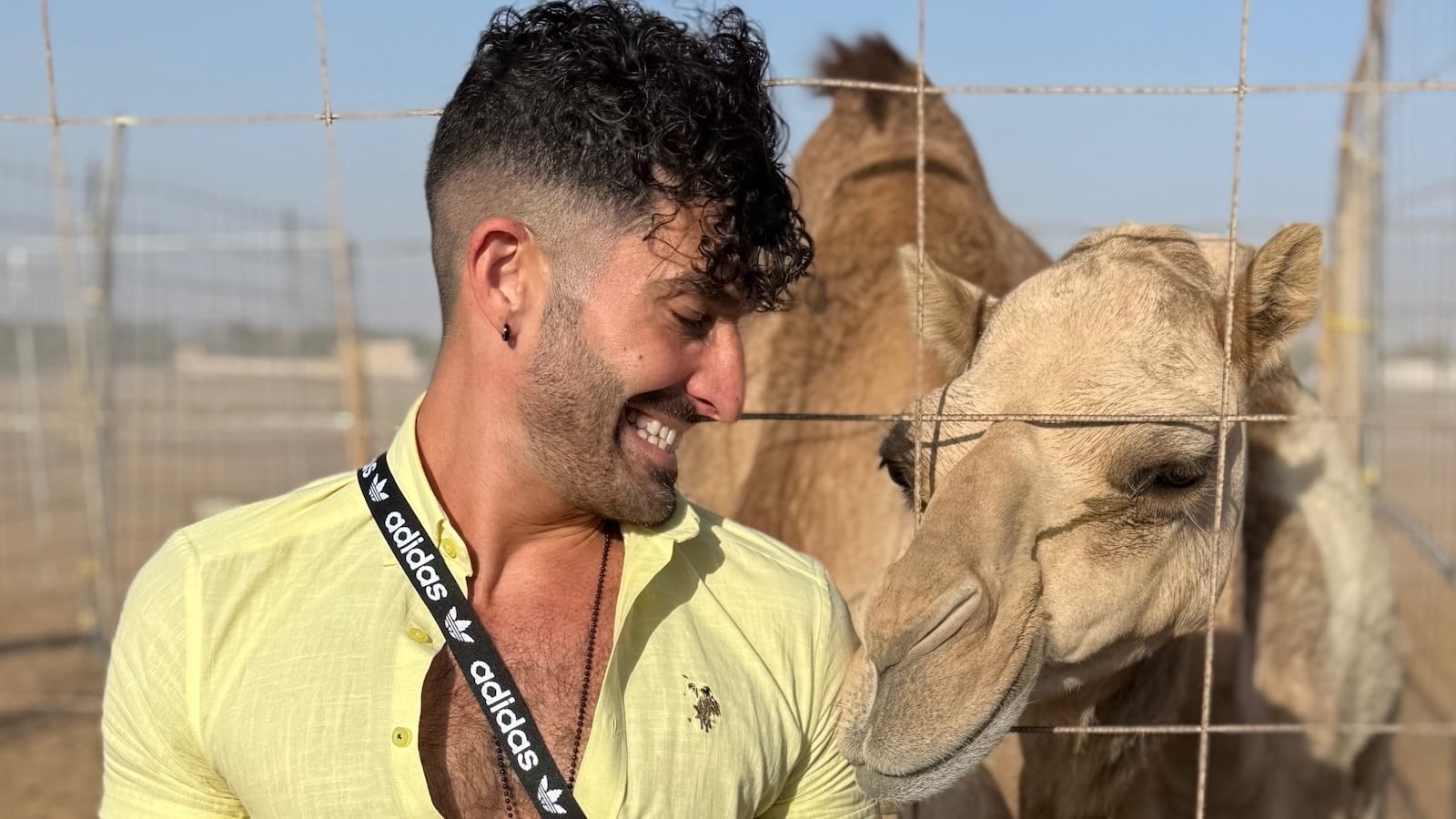
Quick facts about gay Tunisia:
- Gayday Magazine: launched in March 2011, became Tunisia's first online LGBTQ magazine.
- Mounir Baatour is the first openly gay man to run for president in a Muslim country!
- Shams Rad radio: Tunisia is the first country in the Arab world to have an LGBTQ radio station:
Tunisia has gained a positive reputation amongst the LGBTQ community of the Arab world, particularly due to the strong activism of organizations like “Association Shams” and “Mawjoudin”, who have been campaigning hard for LGBTQ minorities' rights. On 18 May 2015, “Association Shams” even received government recognition as an official organization.
More recently, an openly gay man, Mounir Baatour, is seeking to run for President! Whether or not he'll succeed, the very fact that he is able to run says a lot!
In terms of gay events in Tunisia, small discreet Pride receptions have taken place in private, mainly in the capital, Tunis. Most impressive is the Mawjoudin’s Queer Film Festival, which successfully took place in January 2018. This was a big deal because it was the first-ever public film festival in Tunisia to celebrate the country's LGBTQ community.
Gay rights in Tunisia
Whilst homosexuality is illegal in Tunisia with up to 3 years imprisonment (Article 230 of the 1913 Penal Code), activism is so strong that there are signs that this is likely to change very soon. For example, in June 2018, a government-sponsored committee called the Individual Freedoms and Equality Committee (COLIBE), advised President Essebsi to decriminalize homosexuality in Tunisia.
In addition, in April 2020, one particular gay marriage was legally recognized in Tunisia for the first time. Whilst gay marriage and homosexuality both remain illegal in Tunisia, this is still a small win for the Tunisian LGBTQ community! But sadly, until the anti-gay law is overturned, the LGBTQ community will continue to be harassed and risk being arrested for being openly gay.
4. Oman
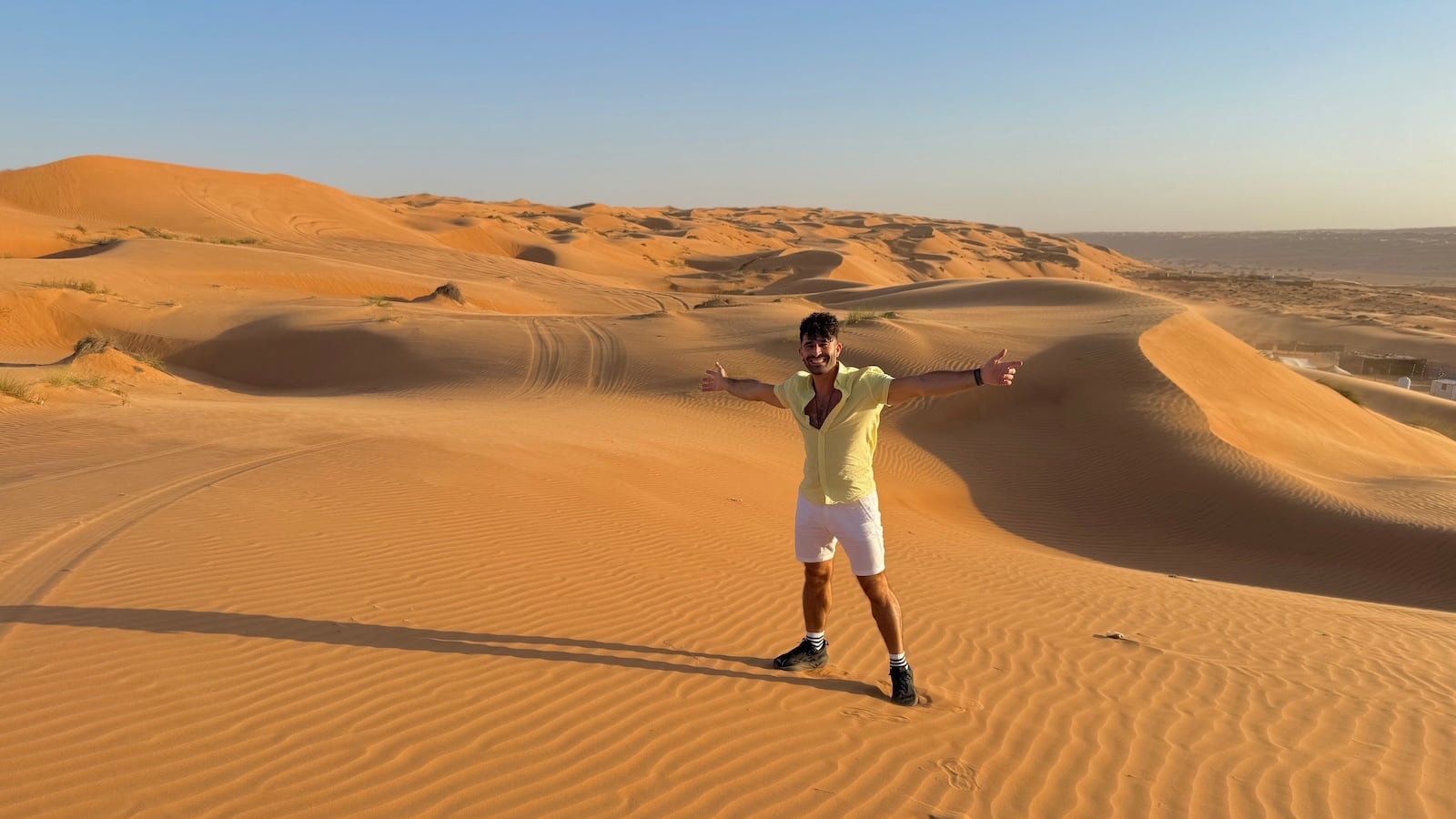
Quick facts about Gay Oman:
- There are no pro-LGBTQ laws in Oman: but crime is low, and it is a very safe country on the whole…just avoid any public displays of affection to prevent any problems. Straight couples are advised to do same.
- Well-educated and tolerant: Omanis are well-known for being well-educated and tolerant. The Ibadi branch of Islam does not permit open conflict and hostility, which is why they are regarded as being more liberal than some of their Gulf neighbors.
Whilst the Gulf States are notorious for having some of the worst anti-gay laws in the world, Oman is another tolerant haven in the region. Omanis are proud of their culture, but they are more laid back and open-minded compared to their neighbors. A large part of this is because they practice Ibadism, a branch of Islam, which emphasizes tolerance and coexistence.
With regard to the gay scene in Oman, everything is underground, as is the case with most Arab countries. We advise using gay dating apps to connect with locals to discover more. Due to the strong censorship laws, you will need a decent VPN to do so.
LGBTQ rights in Oman
On the face of it, homosexuality is illegal in Oman, punishable with a jail sentence of up to 3 years. However, cases rarely get to court unless there is a risk of a public scandal. In 2013, an article in an Omani newspaper called “The Week” suggested Oman was more tolerant of LGBTQ people compared to the other Gulf states.
The Omani government (mainly led by the influential Shura Council, Tawfiq al-Lawati) responded by threatening to shut down the paper unless it publicly apologized, which it subsequently did with an entire front-page article.
Oman is stunning. We found it to be authentic in culture and rich in impressive landscapes, from the deserts to the beautiful beaches by the Gulf of Oman waters. Unlike most other capital cities in the Gulf, Muscat has no high-rise buildings. Instead, it's surrounded by mountains, making it unique.
Oman is a wealthy nation and neutral in foreign relations, which makes it a safe place to visit. The majority of Omanis are well-educated, civilized, and down-to-earth, which makes being gay in Oman slightly easier as long as you're discreet. Be sure to check out our detailed gay travel guide to Oman.
3. Saudi Arabia
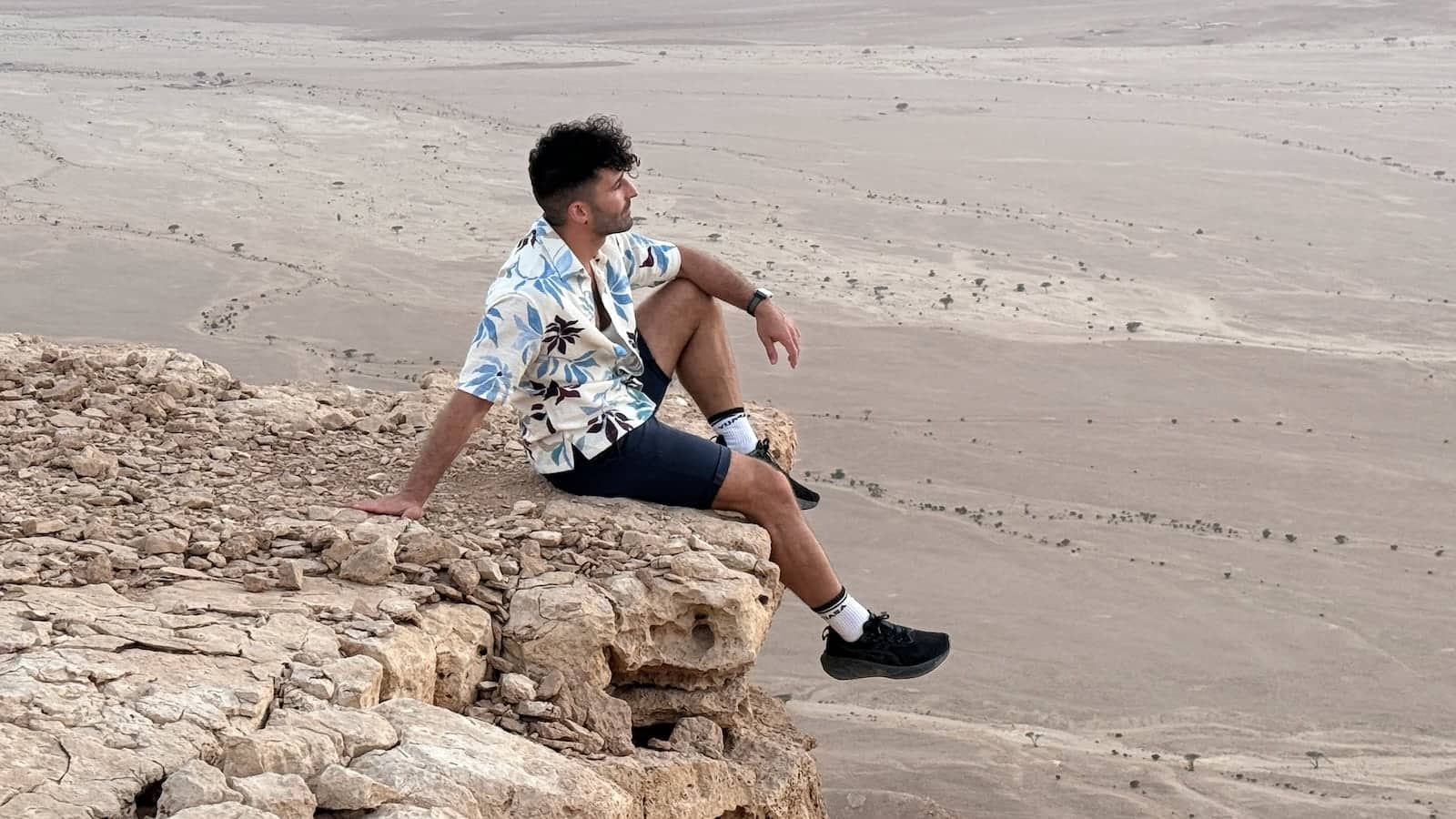
Quick facts about gay Saudi Arabia:
- Anti gay law? Saudi Arabia has no criminal code, so no anti gay law. But it follows Sharia Islamic Law, which penalizes homosexuality by capital punishment, imprisonment, fines, flogging, and deportation for foreigners. But as part of its Vision 2030 to modernize, it has curbed the powers of the religious police. Hence the question mark…
Saudi Arabia has a bad rep. Before my visit to Saudi Arabia in 2025, the overall response I got from all my friends was along the lines of ‘OMG, be careful Stefan, it's so dangerous for gays there, don't get arrested or flogged! etc etc'
And I get it. But this couldn't be further from the truth. As part of the Saudi Vision 2030, the country is aggressively moving away from oil to other industries, like tourism and sport. Since 2016, the powers of the religious police have been curtailed. Women are now allowed to drive, entertainment is permitted (eg, concerts, sports events), the Hijab is no longer compulsory, equal pay for both sexes, foreign tourism is allowed, and more. The result of this, the LGBTQ+ community that was underground before, has become more bold and visible than ever before.
Within minutes of opening up Grindr in Jeddah and Riyadh, I was quickly able to connect with locals and get invited to parties happening. Queer friendly events take place across the country throughout the year such as MDL Beast. Whilst this is also the case in Dubai, the difference is that in Saudi Arabia, it is driven by LGBTQ+ locals as opposed to foreigners. Read more
LGBT rights in Saudi Arabia
Historically, Saudi Arabia works on Sharia Islamic Law, which has a nasty take on homosexuality. Being openly gay here used to get you into a lot of trouble. However, since the push to modernize began in 2016/2017, the powers of the religious police have been curtailed. Speaking to a variety of LGBTQ+ Saudis about this, they would argue with me – “Saudi Arabia does not have an anti gay law!” They're not wrong – Saudi Arabia has no codified criminal code. Instead, it follows Sharia Law, and judges use their discretion to implement it…so they're not strictly right either.
But with the push to modernize, attract investment and tourism, no LGBTQ+ people have been convicted over the last few years. The Saudi Tourism Authority even updated its FAQs on its website in May 2023 to include a question for LGBT travelers:
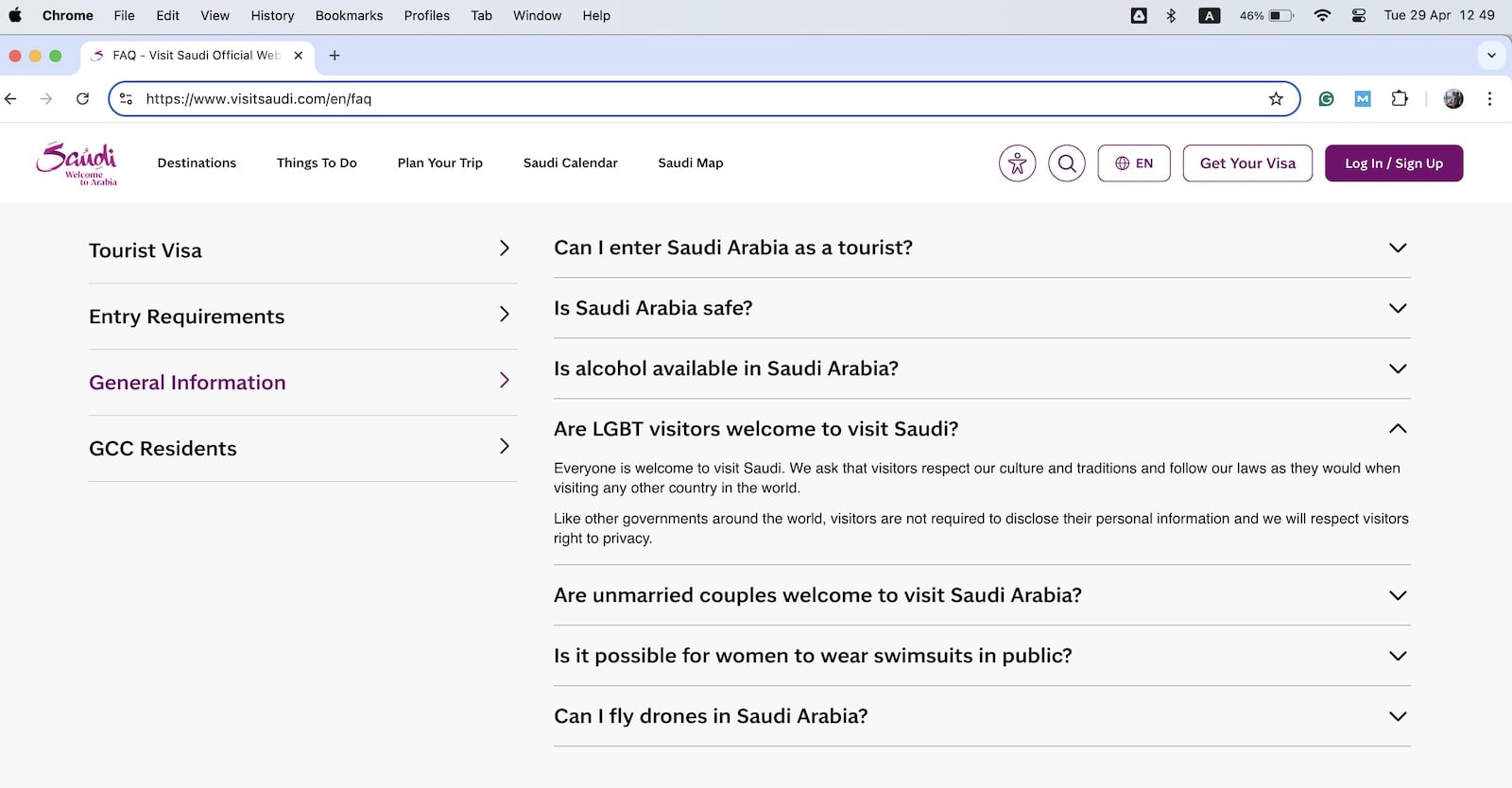
2. Jordan
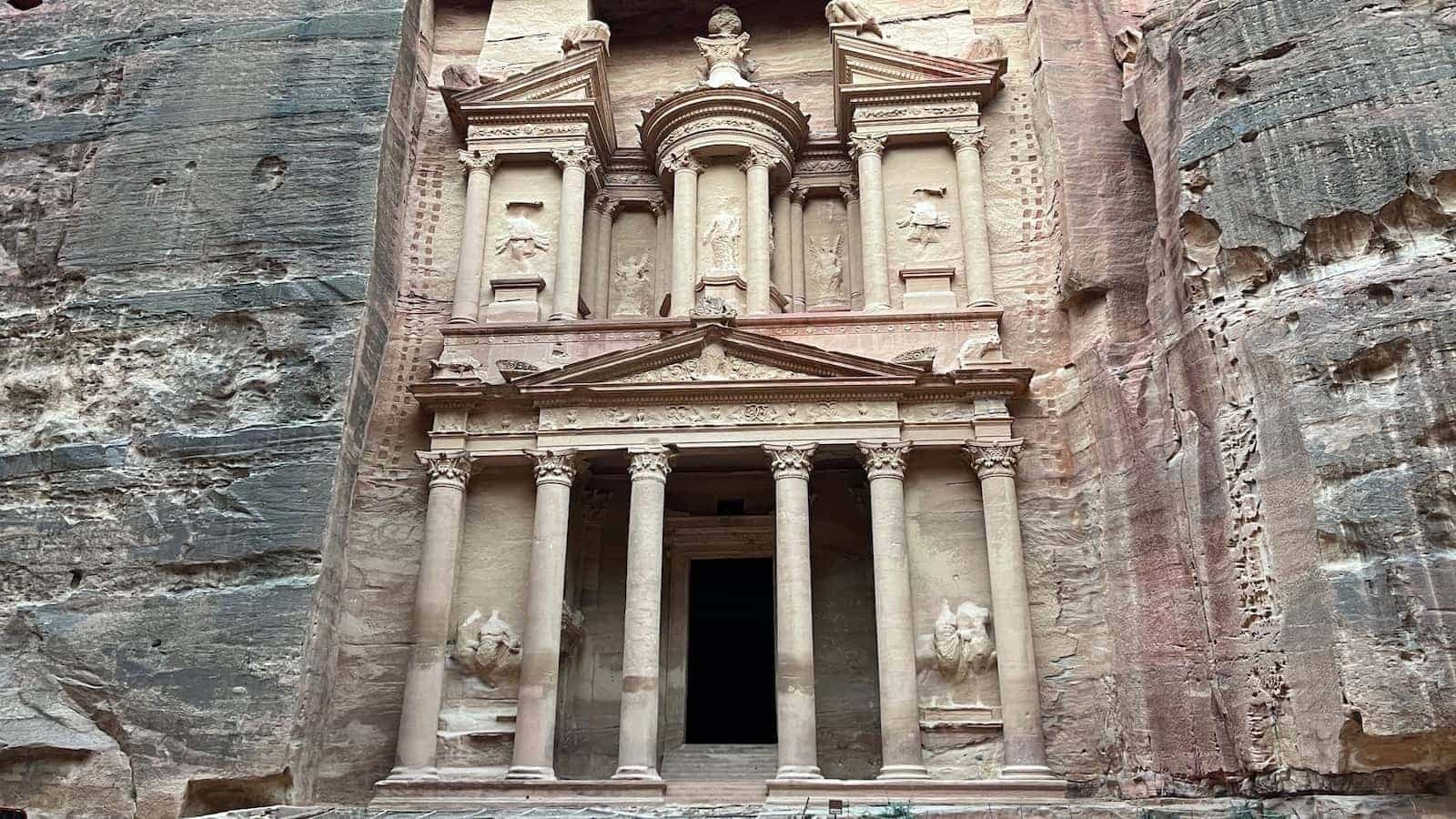
Quick facts about Gay Jordan:
- Being gay was legalized: in 1951, but if you're openly gay you may be prosecuted under “public morality” laws.
- Right to change legal gender: allowed by the Cassation Court (Jordan's highest Court) in 2014. However, in April 2018, Parliament passed laws banning gender reassignment surgery.
- My.Kali: the Arab world's first LGBTQ online magazine was created in 2007 by handsome Jordanian model and activist, Khalid Abdel-Hadi:
Jordan's draw as a huge tourist attraction in the Middle East has helped bolster its gay credentials. So much so, that LGBTQ tour companies often offer Jordan as an add-on for holidays to Israel. We can understand why, given that such a small country offers unique cultural gems like Petra, Wadi Rum, and even a slice of La Mer Morte.
In terms of public gay events in Jordan, there have been several over the years, mainly for the International Day Against Homophobia, Transphobia, and Biphobia.
Whilst there is no obvious gay scene in Jordan, there is an underground scene, which you're likely to discover by befriending locals on Grindr. One well-known gay friendly bar in Amman is Books @ Cafe, which becomes a club on weekends. Read more in our gay guide to Amman.
LGBTQ rights in Jordan
On the one hand, Jordan appears to be one of the most progressive LGBTQ countries in the world for the simple reason that it decriminalized homosexuality in 1951, nearly 2 decades before the UK! At the same time, it also reduced the age of consensual relationships to 16, which is the same for heterosexuals. That already puts it miles ahead of all the other Arab countries!
Sadly, the LGBTQ community is victimized and prosecuted under laws relating to the disruption of “public morality”. For example, in 2017, the Lebanese band Mashrou’ Leila was banned from performing in Jordan by the Ministry of Interior because their lead singer, Hamed Sino, is gay! Get inspired with our gay travel guide to Jordan.
1. Bahrain
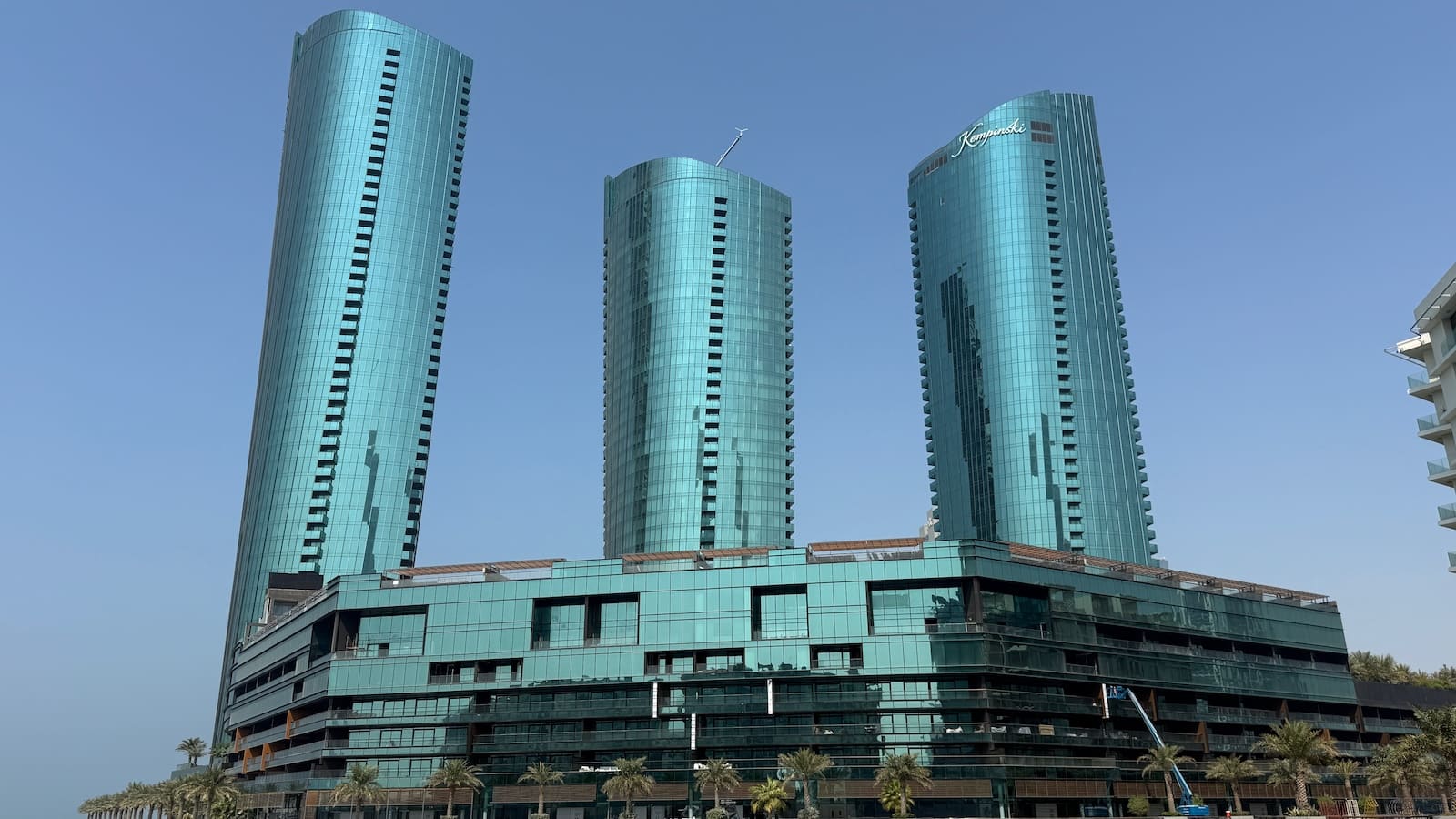
Quick facts about Gay Bahrain:
- Being gay was legalized: in 1976, but if you're openly gay you may be prosecuted under laws relating to “public morality”.
- Right to change legal gender: in 2014, a High Administrative Court ruled to allow 2 women to have a gender reassignment surgery and be recognized as men following their surgery.
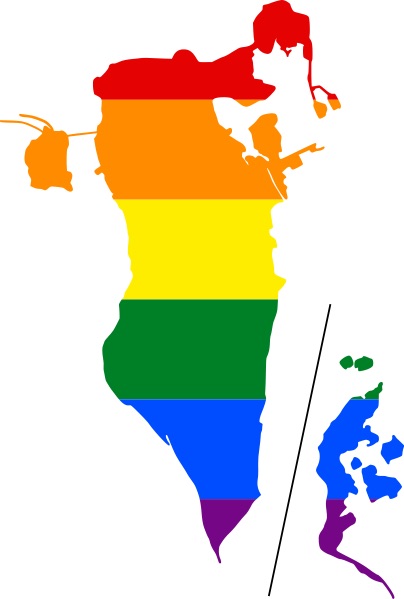
Bahrain is often considered to be the most tolerant of all the Gulf States. So much so, that the Saudis nickname Bahrain “the Bar” because it’s where they can easily drive for a weekend trip to buy alcohol and “meet people” freely(!)
In the media, homosexual issues were discussed as early as 2001 in the Arabic language newspaper, “Al-Meethaq”, and subsequently in the English language paper, “Gulf Daily News”.
LGBT rights in Bahrain
On the face of it, like Jordan, Bahrain is another shining gay star in the Arab world, having legalized homosexuality as early as 1976. It also has an equal age of consent of 21 for both straight and gay couples.
Sadly, other sections of the Bahrain Penal Code relating to “public immorality”, “public indecency”, and “immoral behavior” are used to crack down on the LGBTQ community in much the same way as it has been used in Jordan. But by the strict standards set by Arab countries, Bahrain remains the most liberal nation in the region for LGBTQ+ travelers. When we visited, we had no issue at all getting a double bed in any hotel we stayed at. LGBTQ+ locals we met also felt more free here than anywhere else in the region.
DON'T MISS OUT!
Join our newsletter
Subscribe now to receive in-depth FREE travel guides, along with inspiring stories, savvy planning tips, and exclusive discounts on gay tours.
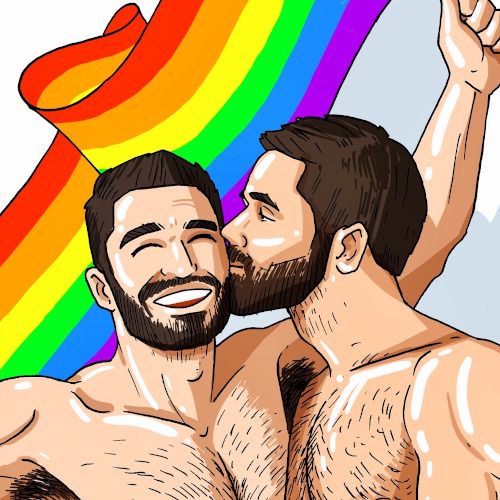
Looking for a gay friendly tour guide in the Arab World?
We've got your back! We've buddied up with an excellent company that can offer tours in and around the Middle East. However, for their security, they've asked to remain anonymous in this blog post. Therefore, if you're interested, message us privately by email or leave a comment in this article and we'll get you introduced electronically pronto.
Click here to see more from these cute Arab twins on Instagram.
Read more travel adventures like this in our book!
We've published our very own gay travel book called, ‘Out in the World'. It has all our practical safety tips, first-hand advice, and travel stories from some of our favorite destinations.
We hope it inspires you to have a fun and safe trip!
Click on the book to order:

For more inspiration:
- If you're transiting in Doha be sure to check out our gay travel guide to Qatar
- Find out which are the most gay friendly countries around the world as well as in Asia
- Read what we think are the most gay friendly cities in Europe and the world.
- While you're at it, these are the biggest gay pride events in the world to check out
- If you're heading to pride, these ideas for fabulous gay pride outfits will inspire you
- And you will need these useful gay pride accessories too!
- If you're cruising in the Caribbean, read which Caribbean islands are safe for gay travelers
- Use our guide to learn more about which are the top LGBT-friendly vacation destinations in the world
- As well as why we love attending London Pride every year
Like this post? Pin it
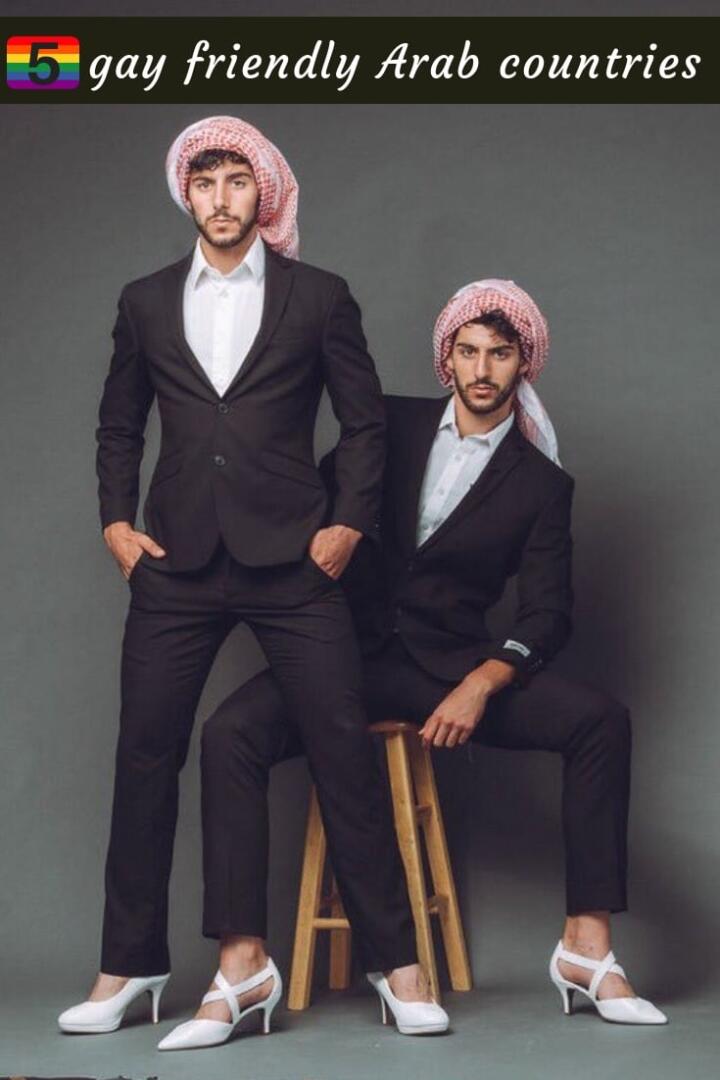
Happy travels are safe travels
We recommend you always take out reputable travel insurance before your next vacation. What happens if you suffer from illness, injury, theft, or a cancellation? Many gay travelers forget about it and regret it when something happens. Better to pay a small price and have peace of mind and not worry.

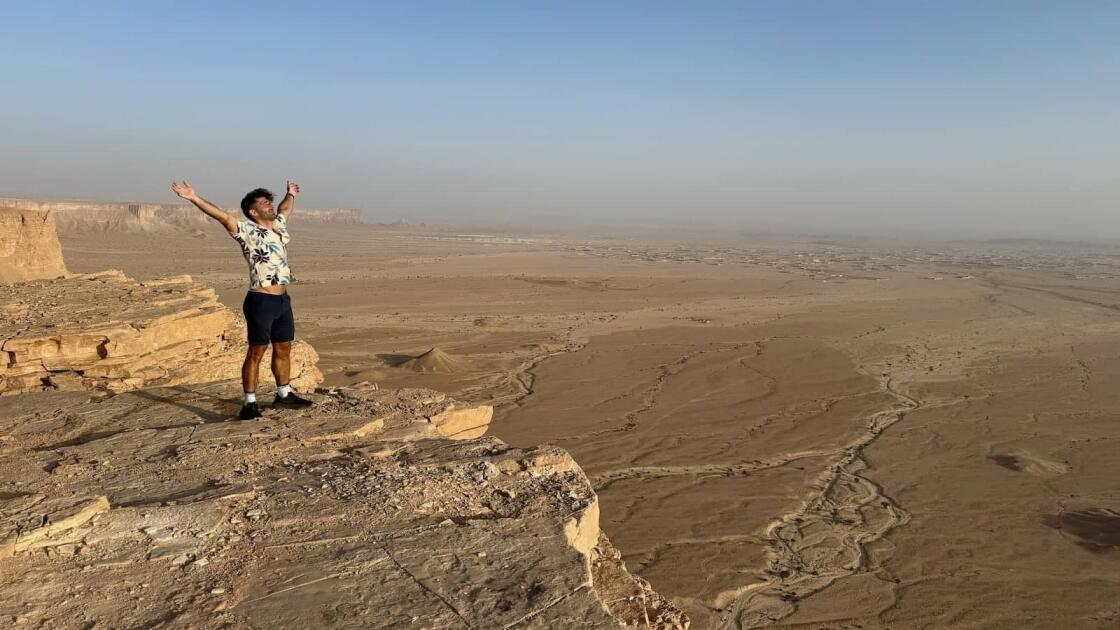
Joe Bananas
Thursday 4th of July 2024
Just for the record : Qaboos, the former sultan of Oman, did not divorce his wife.She divorced him! Apparently under Islamic law a wife can obtain a divorce from her husband if he ultimately proves unable to perform 'the deed'. Not surprisingly he couldn't. Presumably he lived happily ever after.
Stefan Arestis
Sunday 7th of July 2024
LOVING that Girl Power energy :)
Pedro
Monday 5th of April 2021
The best gay friendly country in the Middle East is in no doubt Israel no Lebanon.
Stefan Arestis
Monday 5th of April 2021
Yes, but Israel is not an Arab country, which is the focus of this article.
DMCGEE
Wednesday 24th of March 2021
After reading your article and talking with gay men here in Canada who used to live in the region... I think I am much more comfortable now visiting the Middle East as it has always been on my bucket list to visit the ancient sites in Egypt and Jordan with my partner. We plan to go in 2022. I can confirm that these former residents told me avoid all PDA's (these are frowned upon for straight couples as well), if anyone asks you, you're friends and that will generally be the end of it. Book hotel rooms with 2 single beds (we can tough it out for a week or so) and stay off hookup apps in Egypt because authorities have been known to use them for entrapment. They recommended deleting all gay apps or any pics from your phone prior to arriving as well - this was recommended for those that want to be uber-cautious in the event that immigration authorities ask to see your phone. Furthermore,according to these former residents, you need to really be causing an overt public stir (think open PDA's or walking around Cairo wearing a rainbow flag) to be arrested as a tourist. I am told authorities generally don't want the hassle of dealing with foreigners and their governments. Am I too optimistic?
Stefan Arestis
Wednesday 24th of March 2021
I think that pretty much sums it up very well in a nutshell!
marto
Thursday 19th of November 2020
I wish to get in contact with you because in my country uganda lgbt"s are persecuted
Moonburst
Saturday 14th of November 2020
I hope there will be a point in time when being gay is decriminalized in all of the Arab Nations and all of the Non Arab Nations whether they have Muslim Majorities or not. Many people in the West talk about Israel being the most or only gay friendly nation in the ME. If Ultra-Orthodox Jews ruled Israel, then being gay would be illegal there and there would also be fewer women's rights: they would be required to wear dresses below knee-length and sit at the back of public buses.
Stefan Arestis
Saturday 14th of November 2020
We are pleased that ultra-Orthodox Jews do not rule Israel then eh?